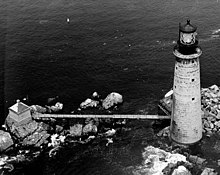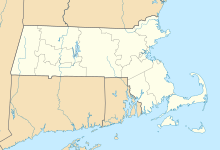The Graves Light

US Coast Guard photo
|
|
| Location | Offshore of Boston, Massachusetts |
|---|---|
| Coordinates | 42°21′53.6″N 70°52′8.7″W / 42.364889°N 70.869083°WCoordinates: 42°21′53.6″N 70°52′8.7″W / 42.364889°N 70.869083°W |
| Year first constructed | 1903 |
| Year first lit | 1905 |
| Foundation | Granite |
| Construction | Granite Block |
| Tower shape | Conical |
| Markings / pattern | Natural with Black Lantern |
| Height | 113 feet (34 m) (tower) |
| Focal height | 96 feet (29 m) |
| Original lens | First order Fresnel Lens (original) |
| Current lens | VRB-25 |
| Range | 15 nautical miles (28 km; 17 mi) |
| Characteristic |
|
| Fog signal | HORN: 2 every 20s |
| USCG number |
1-390 |
|
Graves Light Station
|
|
| Nearest city | Boston, Massachusetts |
| Architect | Royal Luther |
| Website | www |
| MPS | Lighthouses of Massachusetts TR |
| NRHP Reference # | 87002041 |
| Added to NRHP | September 28, 1987 |
| Heritage | place listed on the National Register of Historic Places |
|
[]
|
|
1-390
The Graves Light is a lighthouse located on The Graves, the outermost island of the Boston Harbor Islands National Recreation Area, and 9 miles (14 km) offshore of downtown Boston, Massachusetts, USA.
At 113 feet (34 m), it is the tallest lighthouse in the approaches to the Port of Boston, and is an important navigation aid for traffic to and from the port. It was built at the same time that the North Channel into Boston Harbor was dredged to become the principal entrance for large vessels. The Graves are the outermost rocks near the outer end of the North Channel.
It was added to the National Register of Historic Places as Graves Light Station on September 28, 1987, reference number 87002041.
The lighthouse was built in 1905, to a conical design using granite blocks on a granite foundation, and equipped with one of the few first-order Fresnel lens used. The lens assembly stands about 12 ft (4m) tall and is now at the Smithsonian Institution. The light was the setting for the climactic storm in the 1948 film Portrait of Jennie.
Operated by the United States Coast Guard, the light was automated in 1976 and has a characteristic of two white flashes every 12 seconds.
Various sources agree that the ledges were named for a Thomas Graves, but differ on who he was; some prefer a 17th-century English rear admiral; others like a colonial-era American merchant. The USCG history web site shows both. The new owners retained a historian who ascertained that the ledges were named for Rear Admiral Thomas Graves (1605–1653), whose family settled in Charlestown, Massachusetts, but who died in an English naval battle against the Dutch in 1653.
...
Wikipedia

